
.
- Subject:
- Computing and Information
- Material Type:
- Lesson
- Author:
- Drew Treacy
- Russell Hugo
- Washington OSPI OER Project
- Kyle Murbach
- Date Added:
- 07/03/2023

.

.

.

.

.

These lessons show how to modify and adapt frisbee golf.

These lessons show how to modify and adapt Hiking for a inclusive classroom

Agricultural Connections is a middle school curricular program framework created by EarthGen. For this unit, we offer professional development training and assistance with implementation. Please let us know if you are interested in implementing this program at your school or district! Please contact info@earthgenwa.org for more information.

This book by Kim Adelson for the Black Hills Audubon Society helps young children learn about different animals and their characteristics, and whether or not they are birds. Through colorful illustrations and engaging text, the book presents various animals and their habitats, and poses the question of whether or not they are birds. This book is a great resource for educators to introduce children to the world of birds and their unique features.
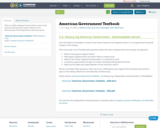
This is an ADA compliant downloadable version of the American Government online textbook at U.S. History.org by The Independence Hall Association.
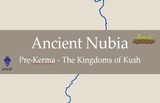
These educational videos provide an invaluable resource on Ancient Nubia for Middle and High School Ancient World History and Geography teachers and students. The video content aligns with Geography, Economics, Civics, and Historical Thinking Social Studies standards across the nation. Key concepts and inquiry skills from each content area weave seamlessly throughout the videos and associated lesson plans. This unit overview document links to developed resources on the Archeology in the Community site.

In this Animating Civic Action lesson, from the Washington Office of Superintendent of Public Instruction and Washington State Governor's Office of the Education Ombuds, students listen to the story of Jared, a student experiencing homelessness. Students are asked to examine what it means to be homeless, to identify how homelessness affects people and to and to consider ways they can act to take action against homelessness in their school community.
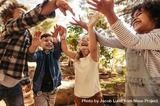
In this Animating Civic Action lesson, from the Washington Office of Superintendent of Public Instruction, students listen to the story of Esther, a student refugee, about her experience in school. Students are asked to examine what it means to stereotype others, and to consider ways they can act to make their community more welcoming and inclusive.
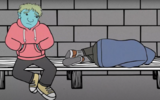
In this Animating Civic Action lesson, from the Washington Office of Superintendent of Public Instruction and Washington State Governor's Office of the Education Ombuds, students listen to the story of Jared, a student experiencing homelessness. Students are asked to examine what it means to be homeless, to identify how homelessness affects people and to and to consider ways they can act to take action against homeless n their school community.
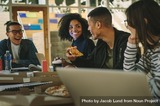
Often throughout American history former refugees rise to be community leaders dedicating their lives to helping others. Refugees often overcome key obstacles including language and culture to become important activists addressing social and political problems. Refugees offer key perspectives on the application of civic virtues and human rights. In this lesson students will hear from three refugee students about their experiences. Then, students will be asked to:Identify and describe obstacles student refugees encounter while assimilating at school.Identify reasons why refugees go on to develop a strong sense of civic duty and desire to give back to their communities. Research and identify ways they can take civic action to build a better community.
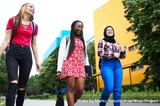
Students will build empathy to be “helpers” and make a difference in the lives of others through consideration of two questions: How can we listen effectively to better understand people’s stories, and how can we respond to and communicate effectively to peoples’ stories? Students will then propose opportunities to take action to improve our community response to support all students and their communities.
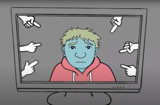
In this Animating Civic Action lesson, from the Washington Office of Superintendent of Public Instruction and Washington State Governor's Office of the Education Ombuds, students listen to the story of Jared, a student experiencing homelessness. Students are asked to examine what it means to be homeless, to identify how homelessness affects people and to and to consider ways they can act to take action against homelessness in their school community.

Sample template for creating a guidance document for educators visiting a particular website or playlist in the Arts. Remix and edit this resource to suit.
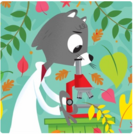
Based out of Washington State University, Dr. Universe teams up with professors, researchers, and experts in the field, to tackle big questions. Explore animated video answers to questions posed by curious questions from students in Washington and around the world. Videos created in partnership with Northwest Public Broadcasting. Though not openly licensed, content is free to view online and listen to via podcast.

Educators and parents can use the Washington Starting Smarter site to better understand the scores and reports for the Smarter Balanced tests, see sample items, and access additional resources.All resources on the site are copyright The Regents of the University of California. Though the connected resources are free for viewing online, please note that your permitted use of the materials for other uses will vary. Image by StartupStockPhotos from Pixabay